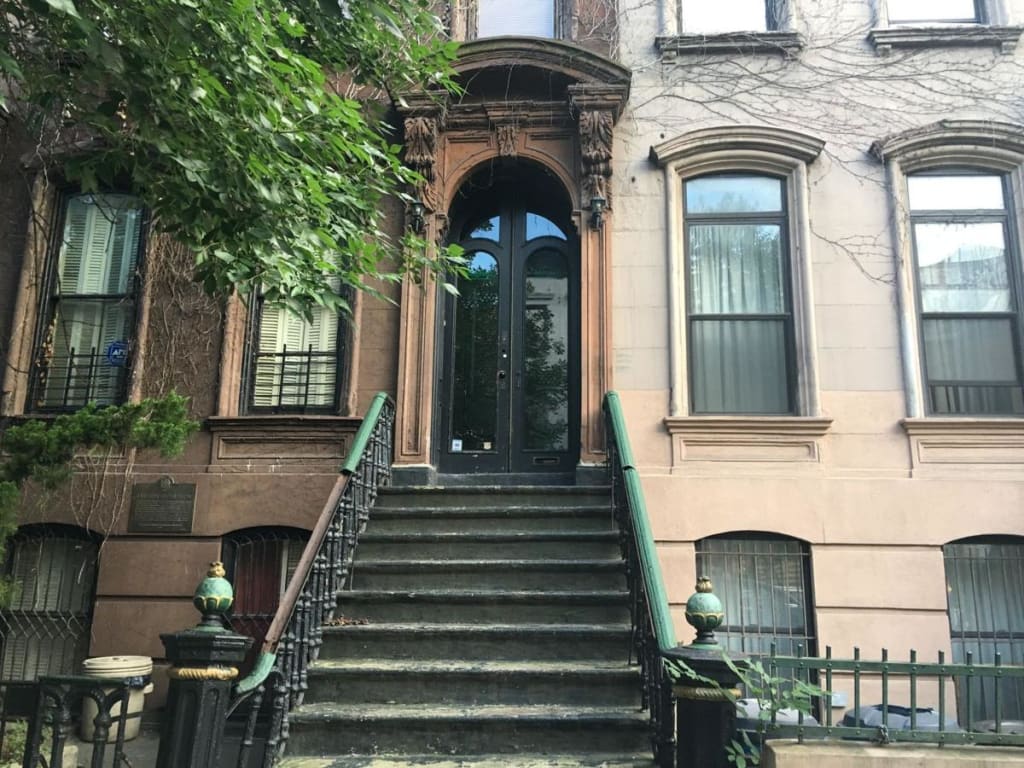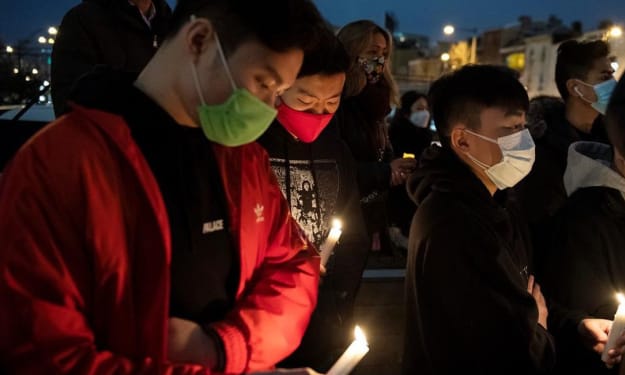Harlem Silhouettes
The House of Mrs. Marketta Wilson

Late in the evenings when the sun has crossed the Hudson River the streets of Harlem fill with magical silhouettes waiting on 135th Street to take a crosstown bus to complete their purpose. I was told when I arrived that one cannot leave Harlem without completing the journey. I soon understood or believed it to be my birthrights to understand that Harlem was not just a stop off the A-train at 125th Street but a piece of the universe where every story ever told was kept. Maya Angelou, James Baldwin, and Malcom X all agreed the journey needed completion if you were to come to Harlem. There were no exceptions, everyone had a story, everyone had a ticket, even Cousin June Bug from Delphi made the weary journey Up South with a song - for that reason he deservedly deserves a statue somewhere between 110th and 150th street.
Most Harlemites involved with Manhattan Community Board 10 will agree yet the community board lacks funding to erect monuments, and beside Harlem would be littered with statues of every person who crossed 110th and Central Park; surely if the funds were in place there would be landmarks of whom slept here on every side street from Morningside Park to St. Nicholas, resembling a trip through the Berkshires where trees and taverns are tagged with George and Martha Washington stopped here to have tea with the Continental Congress during the American Revolution; well, so be it if Jelly Roll Morton, Oscar Micheaux, Countee Cullen, and the many souls who did not make it into the history books but made it to Harlem, funds or not, they should be remembered at least with a plaque on the building's cornerstone where they rested their weary heads for a fortnight. A plaque that simply reads something like this -
This house erected in the year of 1904 on West 132nd Street is the home of Mrs. Marketta Wilson who in 1942 left the state of Texas in pursuit of finding a hiding place to keep her only secret; but instead became the first black woman who did something on Broadway that white people weren't allowing black women to do at the time she did whatever it was she did that caught the attention of Lucille Lortel and Helen Haye who were so amazed by the thing that she did that they gave to Marketta $20,000.00 as an opening night gift which she immediately after the curtain came down rushed to meet a broker at Sardi’s on West Forty Fourth Street and Broadway. Marketta was ushered to seat in the back of the restaurant with the wait-staff to wait for the broker.
A rather long plaque but not as long as Eubie Blake's on West 138th Street. Black people are natural storytellers who hate leaving out the slightest bit of details. Marketta needed that part to be on the plaque; her feelings of anxiety that choked her breath while she sat there watching the maître d's jet-black hair that looked like a frozen waterfall on top of his head coming closer and closer to the back of the restaurant. She nearly shattered into pieces there in her seat when his long finger taped on the service door window for her to follow him. She stood and followed without making a sound. She learned early from her time down south that that is what you do as a black woman, you followed without asking questions because the world of men and white people were more unpredictable than the weather in Texas when it came to a black woman having questions to be answered. The maître d' brought her to a table in the center of the restaurant where sat a bald round man - who did not seem to notice she was Black and wearing a chorus girl costume with yellow feathers. The bald round man waved the maître d' way and Marketta sat to listen to him well into the early hours of the morning. Finally, the bald round man placed papers on the table and pointed to her to sign, here, here, and here. Every part of Marketta's lungs froze as stiffly as the maître d's hair at the thought of signing anything. The bald round man waved for a waiter to bring water.
It was that moment Marketta for the first time notice the entire restaurant was filled with well-dressed after theatre patrons and every face at every table eye were on her. She wasn't frightened but felt strangely as if it were the first time in her life to lift her head to see that the world was looking back at her over the footlights. Not one person made a sound, except for a woman who Marketta was sure was Mae West thumbing through a Playbill with Marketta's face on the cover. A few people cleared their throats and a waiter slowly poured water into Marketta's glass, then the bald round man pushed a rather plain fountain pen across the table for her to use. Marketta turned to face Mae West who smiled and said, "Between two evils, I always pick the one I've never tried before."
Marketta picked up the pen and chose ownership, neither good nor evil, it was simply something she had never tried before. Mae West like a good witch in a fairytale waved a sparkly diamond studded wand and the frozen parts of Marketta's body thawed, ran with excitement that could no longer be contained in her seat. She leapt from the chair and threw the $20,000.00 dollars into the air. The maître d' shouted, "Champaign for everyone!" The people stood to their feet cheering Marketta, giving her ovation after ovation, the waiters rushed her with flowers, while the bald round man grumbled as he collected the money. The last line on the plaque reads, this is not the end of Marketta Wilson's journey.
I arrived in New York July of 1986 from Texas along the same route as Mrs. Wilson, but Harlem would not be my purpose until death broke my heart in Hell's Kitchen. Well, death and love is the same as walking on water, never take your eye off either one; for if you do you will find yourself like St. Peter sinking into the Sea of Galilee or in my case a taxi ride headed uptown to see Jesus... with everything a young twenty one year old playwright had desired to own, one suitcase containing a copy of Richard Wright's Black Boy, a portable typewriter, and clean underwear which was all I had when I boarded the Greyhound bus with my lover.
I should not be misleading. Eddie was not my lover but an offbeat, unkept, deeply troubled white boy I could not get rid of after I slept with him. I really wasn't sure if he was gay or I for that matter, but what was certain one of us was not doing something right. Just when I was to end it, finally finished and out of breath in this fond chase Eddie handed me two tickets to New York City leaving at the stroke of midnight. I was speechless, and remained speechless until I heard the stage manager shout, "Five minutes to places, please." It was the closing night of A Midsummer’s Night Dream and I realized I was in the wrong play even though I wore the head of an ass, I was in the wrong play holding in my hands the wrong props; two magical beans bought by a poor senseless boy who took the last in the coffers that had been set aside to fix the roof, buy a cow, and apply to UCLA Graduate School. What was I to do, the rent was gone, the cupboards were bare, and the mice were getting bolder, so into the woods? The trip had turned into a great American adventure or as Truman Capote once said, "I supposed someone had to write the fairy Huckleberry Finn," or at best for this story the pansexual performance of the musical Big River: a three-day trip on a dirty dog headed to New York City.
Philadelphia is where I took my eye off Eddie. A summer down pour delayed the bus from leaving the terminal; and I so engrossed in a copy of Dreamgirls: My Life As a Supreme by Mary Wilson someone had left behind that I hadn't notice Eddie was gone. I was terrified, the bus was only hours away for New York City and Eddie had vanished. I panicked when the bus pullout, I pushed down the seat's window and yelled for Eddie, the light rain drops mask my tears. I thought had it been possible that Eddie, all this time, had been an imaginary me all these years - a me I did not know how to love or to love me?
Before I knew it, the bus was leaving the Jersey Turnpike and entering the Holland Tunnel, then through a system of more underground tunnels before traveling up tightly wingding passages inside a garage level of the New York City Port Authority Bus Terminal where we were greeted by police officers, cars and ambulances with their lights silently moving.
My first two hours I spent in New York City was in a small dark room listening to a coroner explain to me what had happened along with a police detective explaining to me my rights, and the third hour was spent by me explaining to them the long journey from Texas to New York - that it had started with the purchase of three magical beans, which turned out to be two bus tickets and a bag of heroin that Eddie had overdosed with in the bus's bathroom. After several more hours of questioning, I was finally freed to leave once I had convinced the detective that I truly was from Texas and not connected to a Korean narcotic ring from Hoboken. There was one last question from the coroner regarding Eddie's remains, did he have family. I thought for a moment, and the only information I could give was, I knew him to have a brother in Corpus Christi but other than that Eddie Munster Burfford was a total stranger to me, and sadly I was all he had in the world. The detective asked had I a phone number or an address to be reached. No, I said, I could not even tell you where I am now. The detective took a card from his jacket and gently placed it into my hands as he whispered, "You are in Hell's Kitchen, the morgue at Rooselvet Hospital, 50th and Ninth Avenue. Give me a call when you have found a place," he released my hands and left the room. The coroner slid a large legal manila envelope across the table to me, and in it was all that Eddie owned, a pack of Newport, two cigarette lighters, two hundred dollars in cash, and a little black book. Before I exited the glass doors of the morgue, I took a moment to look back and say goodbye to honest Puck.
"If we shadows have offended,
Think but this, and all is mended,
You have but slumbered here,
While these visions did appear,
And this weak and idle theme,
No more yielding but a dream."
When on the streets I searched through the little black book and found one address in New York City. I hailed a cab, got in, and when I was asked where to, I became overwhelmed, and the only words managed to come out were Harlem... Jesus, Jesus, Jesus... Harlem...
The taxi driver pulled away from the curb saying, "There's more places to find Jesus in Harlem than the Vatican... You, Baptist, Methodist, or Snake Handler?" My reply was, Snake Handler I suppose.
I did not that afternoon find Jesus in Harlem, but I did find a Mrs. Marketta Wilson on West 132nd Street.
About the Creator
Don Wilson Glenn
Is an African American playwright of Native American descent from the Apalachicola Band of Creek Indians of East Texas.






Comments
There are no comments for this story
Be the first to respond and start the conversation.